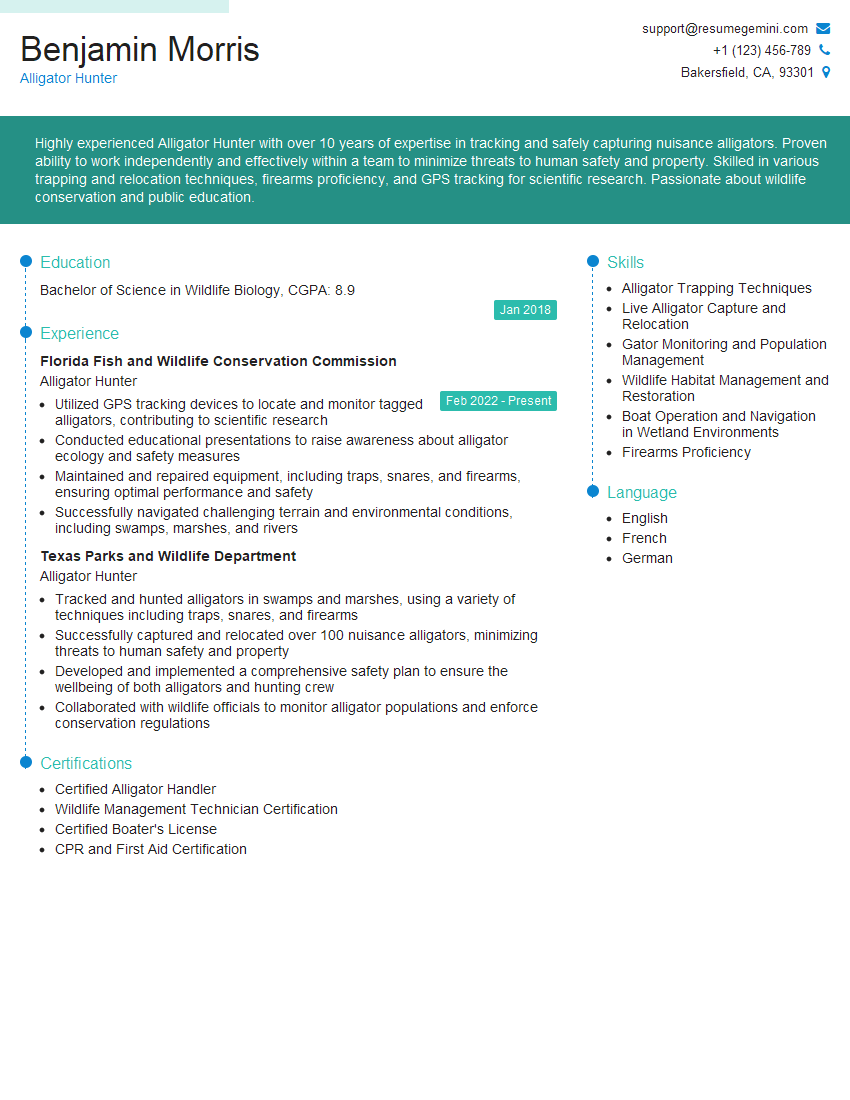Are you a seasoned Alligator Hunter seeking a new career path? Discover our professionally built Alligator Hunter Resume Template. This time-saving tool provides a solid foundation for your job search. Simply click “Edit Resume” to customize it with your unique experiences and achievements. Customize fonts and colors to match your personal style and increase your chances of landing your dream job. Explore more Resume Templates for additional options.

Benjamin Morris
Alligator Hunter
Summary
Highly experienced Alligator Hunter with over 10 years of expertise in tracking and safely capturing nuisance alligators. Proven ability to work independently and effectively within a team to minimize threats to human safety and property. Skilled in various trapping and relocation techniques, firearms proficiency, and GPS tracking for scientific research. Passionate about wildlife conservation and public education.
Education
Bachelor of Science in Wildlife Biology
January 2018
Skills
- Alligator Trapping Techniques
- Live Alligator Capture and Relocation
- Gator Monitoring and Population Management
- Wildlife Habitat Management and Restoration
- Boat Operation and Navigation in Wetland Environments
- Firearms Proficiency
Work Experience
Alligator Hunter
- Utilized GPS tracking devices to locate and monitor tagged alligators, contributing to scientific research
- Conducted educational presentations to raise awareness about alligator ecology and safety measures
- Maintained and repaired equipment, including traps, snares, and firearms, ensuring optimal performance and safety
- Successfully navigated challenging terrain and environmental conditions, including swamps, marshes, and rivers
Alligator Hunter
- Tracked and hunted alligators in swamps and marshes, using a variety of techniques including traps, snares, and firearms
- Successfully captured and relocated over 100 nuisance alligators, minimizing threats to human safety and property
- Developed and implemented a comprehensive safety plan to ensure the wellbeing of both alligators and hunting crew
- Collaborated with wildlife officials to monitor alligator populations and enforce conservation regulations
Certificates
- Certified Alligator Handler
- Wildlife Management Technician Certification
- Certified Boater’s License
- CPR and First Aid Certification
Languages
- English
- French
- German
Career Expert Tips:
- Select the ideal resume template to showcase your professional experience effectively.
- Master the art of resume writing to highlight your unique qualifications and achievements.
- Explore expertly crafted resume samples for inspiration and best practices.
- Build your best resume for free this new year with ResumeGemini. Enjoy exclusive discounts on ATS optimized resume templates.
How To Write Resume For Alligator Hunter
- Quantify your accomplishments: Use specific numbers and metrics to demonstrate the impact of your work, such as the number of alligators captured and relocated or the reduction in alligator-related incidents.
- Highlight your knowledge of alligator behavior: Explain your understanding of alligator behavior and how you use this knowledge to effectively and safely capture them.
- Emphasize your commitment to safety: Showcase the steps you take to ensure the safety of yourself, your crew, and the alligators during capture and relocation.
- Include relevant certifications and training: List any certifications or training programs you have completed, such as the National Alligator Control Training Program.
- Proofread carefully: Ensure your resume is free of errors in grammar, spelling, and punctuation.
Essential Experience Highlights for a Strong Alligator Hunter Resume
- Implement comprehensive safety plans for capturing and relocating alligators
- Conduct thorough risk assessments and determine the most appropriate capture methods
- Collaborate with wildlife officials to monitor alligator populations and enforce conservation regulations
- Utilize GPS tracking devices to monitor tagged alligators and contribute to scientific research
- Maintain and repair equipment, including traps, snares, and firearms, ensuring optimal performance and safety
Frequently Asked Questions (FAQ’s) For Alligator Hunter
What are the educational requirements to become an Alligator Hunter?
Most Alligator Hunters hold a bachelor’s degree in wildlife biology, zoology, or a related field. Some states may require additional training or certification, such as the National Alligator Control Training Program.
What are the physical and mental demands of being an Alligator Hunter?
Alligator Hunters must be physically fit and able to work in challenging terrain, including swamps, marshes, and rivers. They must also have good eyesight, hand-eye coordination, and the ability to remain calm under pressure.
What is the job outlook for Alligator Hunters?
The job outlook for Alligator Hunters is expected to be good over the next few years. As human populations continue to grow and encroach on alligator habitats, the demand for Alligator Hunters is likely to increase.
What are the different methods used to capture alligators?
Alligator Hunters use a variety of methods to capture alligators, including traps, snares, and firearms. The most common method is to use a snare, which is a noose that is placed around the alligator’s neck. Once the alligator is captured, it is typically transported to a holding facility where it is processed and released.
What are the safety risks associated with being an Alligator Hunter?
Alligator Hunters face a number of safety risks, including bites, scratches, and drowning. They must also be aware of the potential for alligators to attack if they feel threatened.